Business Law Report: UK Legal Framework, Business Impact, and Cases
VerifiedAdded on 2020/10/05
|16
|5393
|199
Report
AI Summary
This report provides a comprehensive overview of UK business law, starting with an introduction to the subject and its relevance to organizations. It delves into the sources of UK law, distinguishing between statutory, common, and equity law, and explores the role of government in the law-making process, including the application of statutory and common law in justice courts. The report then analyzes the potential impact of company, contract, and employment law on businesses, emphasizing the importance of legal compliance. Furthermore, it examines different types of legally formed business organizations, offering insights into their management and funding. Finally, the report presents case studies to illustrate the practical application of legal principles and concludes with recommendations for resolving disputes through appropriate legal solutions, providing a clear understanding of the UK legal framework and its implications for business operations.
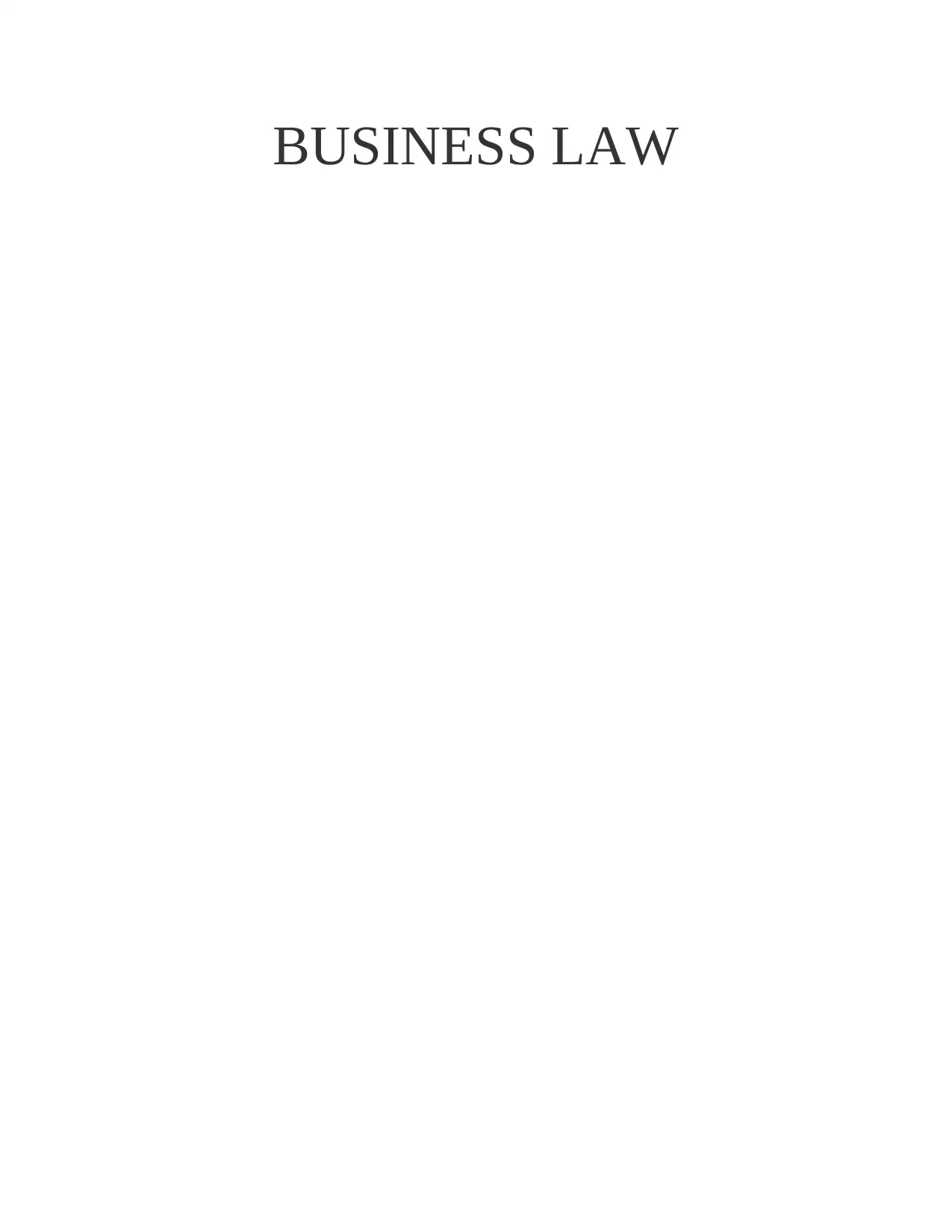
BUSINESS LAW
Paraphrase This Document
Need a fresh take? Get an instant paraphrase of this document with our AI Paraphraser
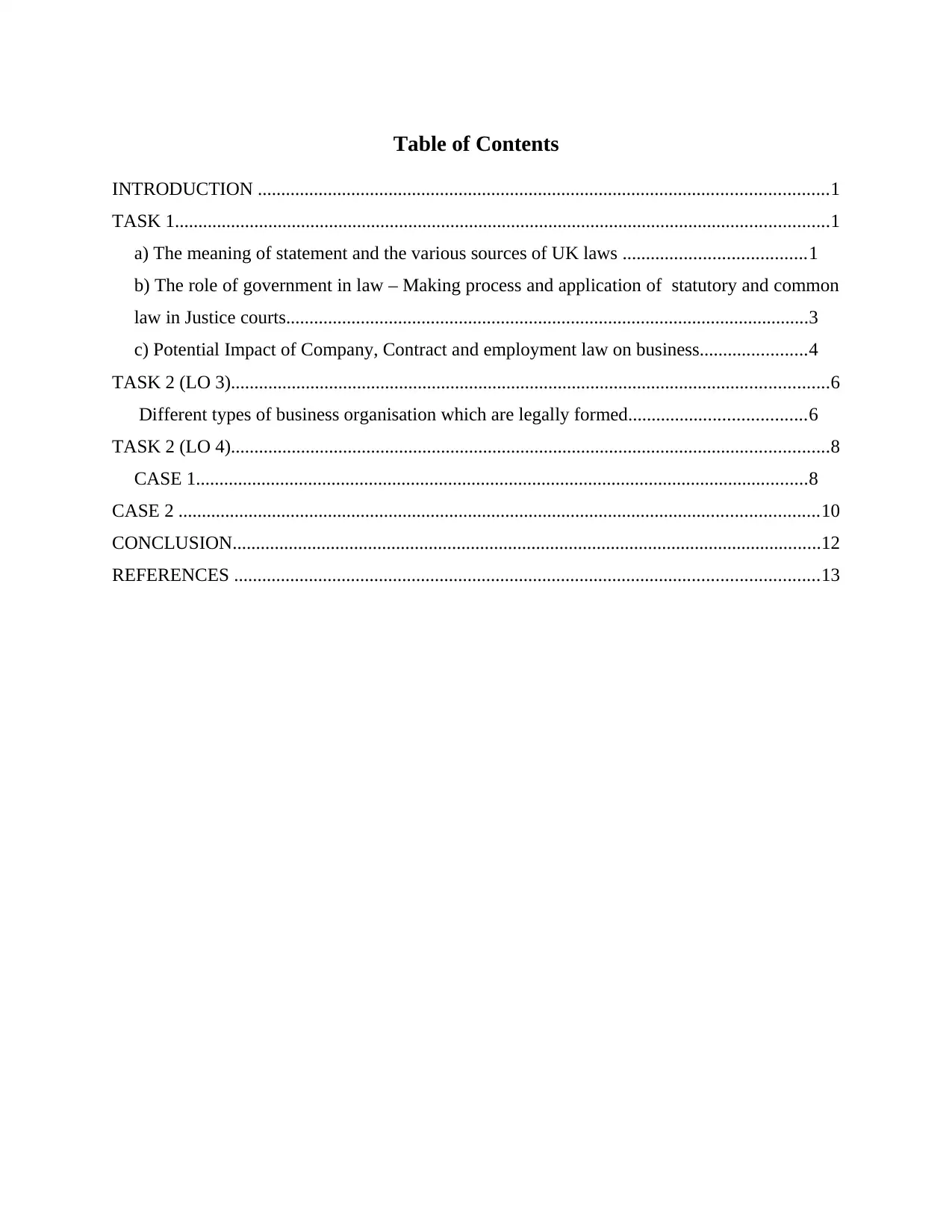
Table of Contents
INTRODUCTION ..........................................................................................................................1
TASK 1............................................................................................................................................1
a) The meaning of statement and the various sources of UK laws .......................................1
b) The role of government in law – Making process and application of statutory and common
law in Justice courts................................................................................................................3
c) Potential Impact of Company, Contract and employment law on business.......................4
TASK 2 (LO 3)................................................................................................................................6
Different types of business organisation which are legally formed......................................6
TASK 2 (LO 4)................................................................................................................................8
CASE 1...................................................................................................................................8
CASE 2 .........................................................................................................................................10
CONCLUSION..............................................................................................................................12
REFERENCES .............................................................................................................................13
INTRODUCTION ..........................................................................................................................1
TASK 1............................................................................................................................................1
a) The meaning of statement and the various sources of UK laws .......................................1
b) The role of government in law – Making process and application of statutory and common
law in Justice courts................................................................................................................3
c) Potential Impact of Company, Contract and employment law on business.......................4
TASK 2 (LO 3)................................................................................................................................6
Different types of business organisation which are legally formed......................................6
TASK 2 (LO 4)................................................................................................................................8
CASE 1...................................................................................................................................8
CASE 2 .........................................................................................................................................10
CONCLUSION..............................................................................................................................12
REFERENCES .............................................................................................................................13
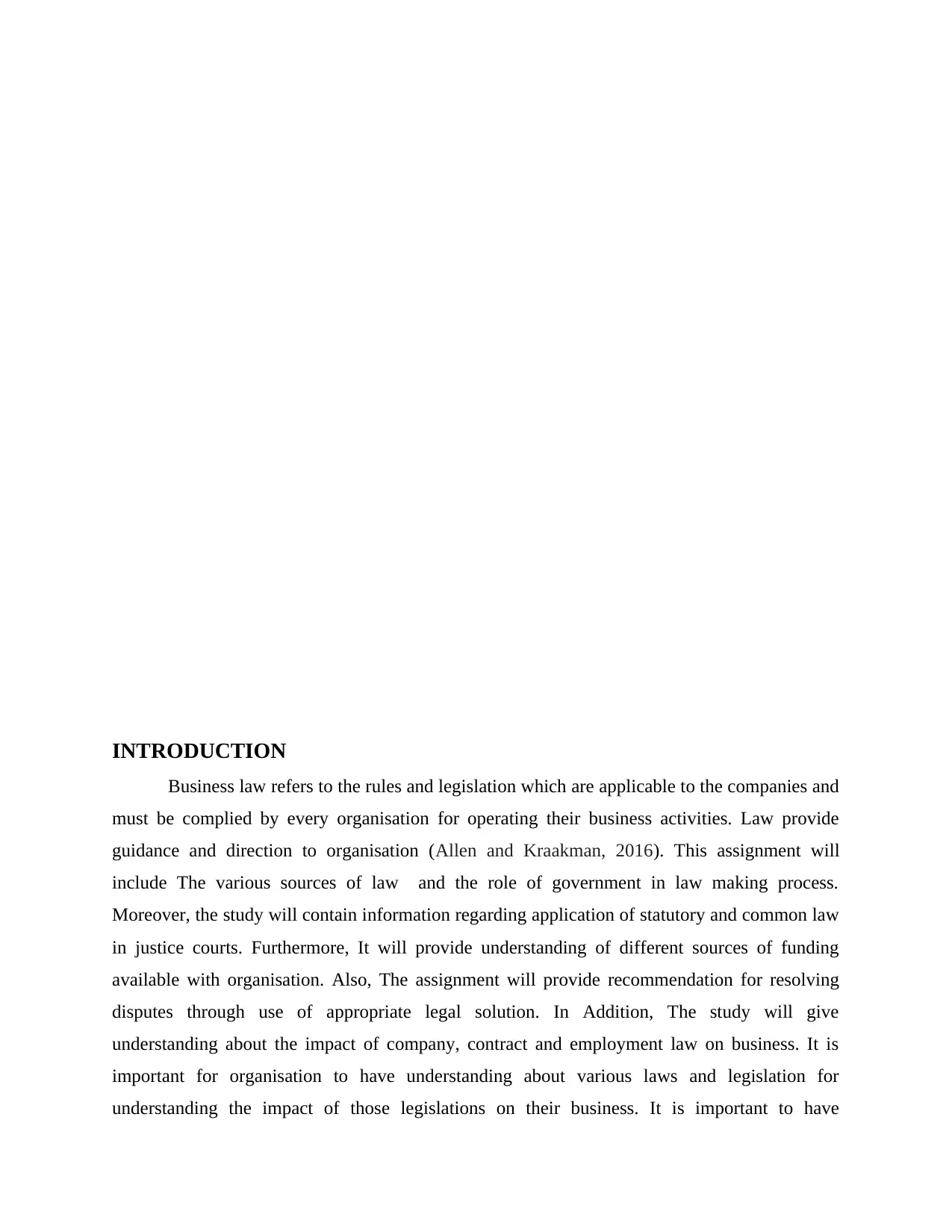
INTRODUCTION
Business law refers to the rules and legislation which are applicable to the companies and
must be complied by every organisation for operating their business activities. Law provide
guidance and direction to organisation (Allen and Kraakman, 2016). This assignment will
include The various sources of law and the role of government in law making process.
Moreover, the study will contain information regarding application of statutory and common law
in justice courts. Furthermore, It will provide understanding of different sources of funding
available with organisation. Also, The assignment will provide recommendation for resolving
disputes through use of appropriate legal solution. In Addition, The study will give
understanding about the impact of company, contract and employment law on business. It is
important for organisation to have understanding about various laws and legislation for
understanding the impact of those legislations on their business. It is important to have
Business law refers to the rules and legislation which are applicable to the companies and
must be complied by every organisation for operating their business activities. Law provide
guidance and direction to organisation (Allen and Kraakman, 2016). This assignment will
include The various sources of law and the role of government in law making process.
Moreover, the study will contain information regarding application of statutory and common law
in justice courts. Furthermore, It will provide understanding of different sources of funding
available with organisation. Also, The assignment will provide recommendation for resolving
disputes through use of appropriate legal solution. In Addition, The study will give
understanding about the impact of company, contract and employment law on business. It is
important for organisation to have understanding about various laws and legislation for
understanding the impact of those legislations on their business. It is important to have
⊘ This is a preview!⊘
Do you want full access?
Subscribe today to unlock all pages.

Trusted by 1+ million students worldwide
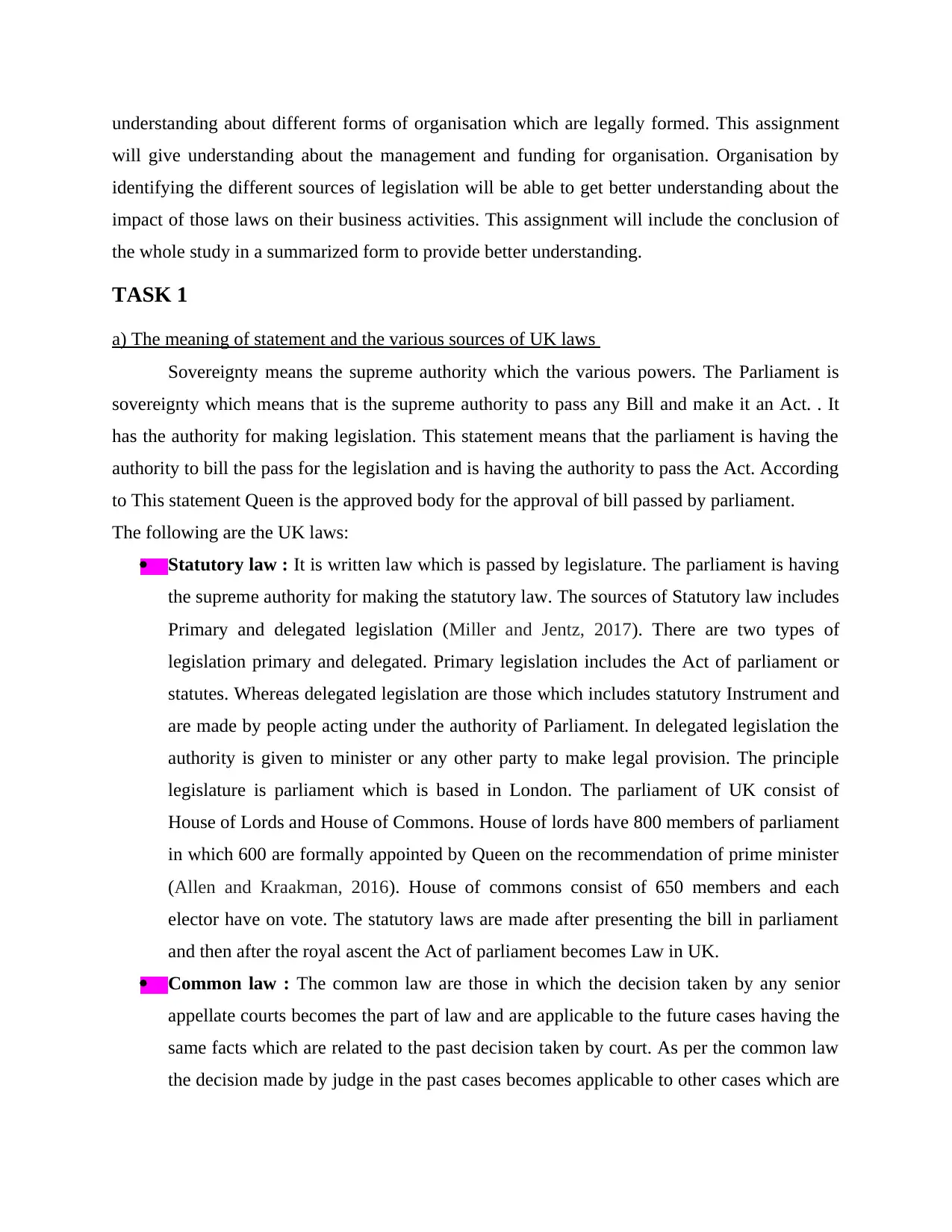
understanding about different forms of organisation which are legally formed. This assignment
will give understanding about the management and funding for organisation. Organisation by
identifying the different sources of legislation will be able to get better understanding about the
impact of those laws on their business activities. This assignment will include the conclusion of
the whole study in a summarized form to provide better understanding.
TASK 1
a) The meaning of statement and the various sources of UK laws
Sovereignty means the supreme authority which the various powers. The Parliament is
sovereignty which means that is the supreme authority to pass any Bill and make it an Act. . It
has the authority for making legislation. This statement means that the parliament is having the
authority to bill the pass for the legislation and is having the authority to pass the Act. According
to This statement Queen is the approved body for the approval of bill passed by parliament.
The following are the UK laws:
Statutory law : It is written law which is passed by legislature. The parliament is having
the supreme authority for making the statutory law. The sources of Statutory law includes
Primary and delegated legislation (Miller and Jentz, 2017). There are two types of
legislation primary and delegated. Primary legislation includes the Act of parliament or
statutes. Whereas delegated legislation are those which includes statutory Instrument and
are made by people acting under the authority of Parliament. In delegated legislation the
authority is given to minister or any other party to make legal provision. The principle
legislature is parliament which is based in London. The parliament of UK consist of
House of Lords and House of Commons. House of lords have 800 members of parliament
in which 600 are formally appointed by Queen on the recommendation of prime minister
(Allen and Kraakman, 2016). House of commons consist of 650 members and each
elector have on vote. The statutory laws are made after presenting the bill in parliament
and then after the royal ascent the Act of parliament becomes Law in UK.
Common law : The common law are those in which the decision taken by any senior
appellate courts becomes the part of law and are applicable to the future cases having the
same facts which are related to the past decision taken by court. As per the common law
the decision made by judge in the past cases becomes applicable to other cases which are
will give understanding about the management and funding for organisation. Organisation by
identifying the different sources of legislation will be able to get better understanding about the
impact of those laws on their business activities. This assignment will include the conclusion of
the whole study in a summarized form to provide better understanding.
TASK 1
a) The meaning of statement and the various sources of UK laws
Sovereignty means the supreme authority which the various powers. The Parliament is
sovereignty which means that is the supreme authority to pass any Bill and make it an Act. . It
has the authority for making legislation. This statement means that the parliament is having the
authority to bill the pass for the legislation and is having the authority to pass the Act. According
to This statement Queen is the approved body for the approval of bill passed by parliament.
The following are the UK laws:
Statutory law : It is written law which is passed by legislature. The parliament is having
the supreme authority for making the statutory law. The sources of Statutory law includes
Primary and delegated legislation (Miller and Jentz, 2017). There are two types of
legislation primary and delegated. Primary legislation includes the Act of parliament or
statutes. Whereas delegated legislation are those which includes statutory Instrument and
are made by people acting under the authority of Parliament. In delegated legislation the
authority is given to minister or any other party to make legal provision. The principle
legislature is parliament which is based in London. The parliament of UK consist of
House of Lords and House of Commons. House of lords have 800 members of parliament
in which 600 are formally appointed by Queen on the recommendation of prime minister
(Allen and Kraakman, 2016). House of commons consist of 650 members and each
elector have on vote. The statutory laws are made after presenting the bill in parliament
and then after the royal ascent the Act of parliament becomes Law in UK.
Common law : The common law are those in which the decision taken by any senior
appellate courts becomes the part of law and are applicable to the future cases having the
same facts which are related to the past decision taken by court. As per the common law
the decision made by judge in the past cases becomes applicable to other cases which are
Paraphrase This Document
Need a fresh take? Get an instant paraphrase of this document with our AI Paraphraser
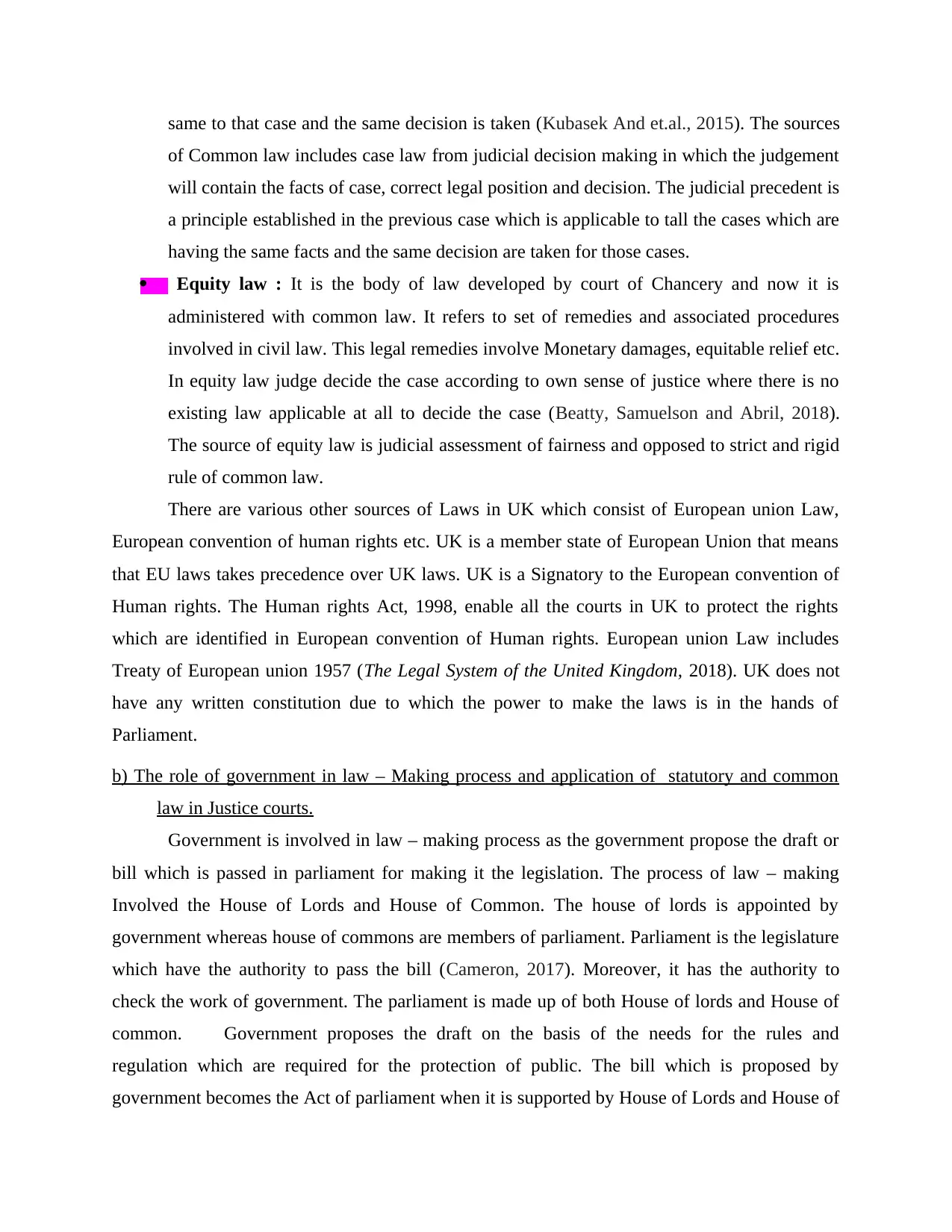
same to that case and the same decision is taken (Kubasek And et.al., 2015). The sources
of Common law includes case law from judicial decision making in which the judgement
will contain the facts of case, correct legal position and decision. The judicial precedent is
a principle established in the previous case which is applicable to tall the cases which are
having the same facts and the same decision are taken for those cases.
Equity law : It is the body of law developed by court of Chancery and now it is
administered with common law. It refers to set of remedies and associated procedures
involved in civil law. This legal remedies involve Monetary damages, equitable relief etc.
In equity law judge decide the case according to own sense of justice where there is no
existing law applicable at all to decide the case (Beatty, Samuelson and Abril, 2018).
The source of equity law is judicial assessment of fairness and opposed to strict and rigid
rule of common law.
There are various other sources of Laws in UK which consist of European union Law,
European convention of human rights etc. UK is a member state of European Union that means
that EU laws takes precedence over UK laws. UK is a Signatory to the European convention of
Human rights. The Human rights Act, 1998, enable all the courts in UK to protect the rights
which are identified in European convention of Human rights. European union Law includes
Treaty of European union 1957 (The Legal System of the United Kingdom, 2018). UK does not
have any written constitution due to which the power to make the laws is in the hands of
Parliament.
b) The role of government in law – Making process and application of statutory and common
law in Justice courts.
Government is involved in law – making process as the government propose the draft or
bill which is passed in parliament for making it the legislation. The process of law – making
Involved the House of Lords and House of Common. The house of lords is appointed by
government whereas house of commons are members of parliament. Parliament is the legislature
which have the authority to pass the bill (Cameron, 2017). Moreover, it has the authority to
check the work of government. The parliament is made up of both House of lords and House of
common. Government proposes the draft on the basis of the needs for the rules and
regulation which are required for the protection of public. The bill which is proposed by
government becomes the Act of parliament when it is supported by House of Lords and House of
of Common law includes case law from judicial decision making in which the judgement
will contain the facts of case, correct legal position and decision. The judicial precedent is
a principle established in the previous case which is applicable to tall the cases which are
having the same facts and the same decision are taken for those cases.
Equity law : It is the body of law developed by court of Chancery and now it is
administered with common law. It refers to set of remedies and associated procedures
involved in civil law. This legal remedies involve Monetary damages, equitable relief etc.
In equity law judge decide the case according to own sense of justice where there is no
existing law applicable at all to decide the case (Beatty, Samuelson and Abril, 2018).
The source of equity law is judicial assessment of fairness and opposed to strict and rigid
rule of common law.
There are various other sources of Laws in UK which consist of European union Law,
European convention of human rights etc. UK is a member state of European Union that means
that EU laws takes precedence over UK laws. UK is a Signatory to the European convention of
Human rights. The Human rights Act, 1998, enable all the courts in UK to protect the rights
which are identified in European convention of Human rights. European union Law includes
Treaty of European union 1957 (The Legal System of the United Kingdom, 2018). UK does not
have any written constitution due to which the power to make the laws is in the hands of
Parliament.
b) The role of government in law – Making process and application of statutory and common
law in Justice courts.
Government is involved in law – making process as the government propose the draft or
bill which is passed in parliament for making it the legislation. The process of law – making
Involved the House of Lords and House of Common. The house of lords is appointed by
government whereas house of commons are members of parliament. Parliament is the legislature
which have the authority to pass the bill (Cameron, 2017). Moreover, it has the authority to
check the work of government. The parliament is made up of both House of lords and House of
common. Government proposes the draft on the basis of the needs for the rules and
regulation which are required for the protection of public. The bill which is proposed by
government becomes the Act of parliament when it is supported by House of Lords and House of
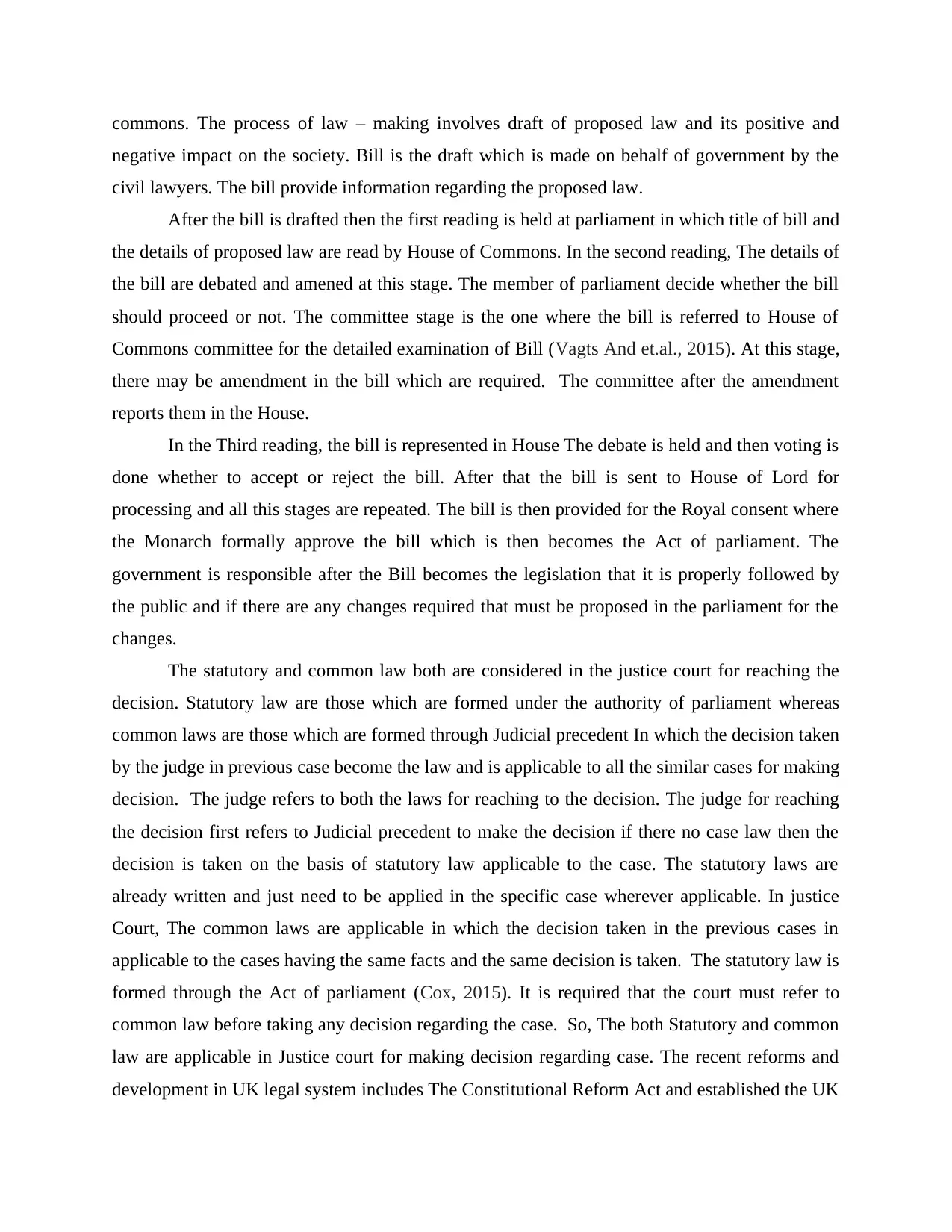
commons. The process of law – making involves draft of proposed law and its positive and
negative impact on the society. Bill is the draft which is made on behalf of government by the
civil lawyers. The bill provide information regarding the proposed law.
After the bill is drafted then the first reading is held at parliament in which title of bill and
the details of proposed law are read by House of Commons. In the second reading, The details of
the bill are debated and amened at this stage. The member of parliament decide whether the bill
should proceed or not. The committee stage is the one where the bill is referred to House of
Commons committee for the detailed examination of Bill (Vagts And et.al., 2015). At this stage,
there may be amendment in the bill which are required. The committee after the amendment
reports them in the House.
In the Third reading, the bill is represented in House The debate is held and then voting is
done whether to accept or reject the bill. After that the bill is sent to House of Lord for
processing and all this stages are repeated. The bill is then provided for the Royal consent where
the Monarch formally approve the bill which is then becomes the Act of parliament. The
government is responsible after the Bill becomes the legislation that it is properly followed by
the public and if there are any changes required that must be proposed in the parliament for the
changes.
The statutory and common law both are considered in the justice court for reaching the
decision. Statutory law are those which are formed under the authority of parliament whereas
common laws are those which are formed through Judicial precedent In which the decision taken
by the judge in previous case become the law and is applicable to all the similar cases for making
decision. The judge refers to both the laws for reaching to the decision. The judge for reaching
the decision first refers to Judicial precedent to make the decision if there no case law then the
decision is taken on the basis of statutory law applicable to the case. The statutory laws are
already written and just need to be applied in the specific case wherever applicable. In justice
Court, The common laws are applicable in which the decision taken in the previous cases in
applicable to the cases having the same facts and the same decision is taken. The statutory law is
formed through the Act of parliament (Cox, 2015). It is required that the court must refer to
common law before taking any decision regarding the case. So, The both Statutory and common
law are applicable in Justice court for making decision regarding case. The recent reforms and
development in UK legal system includes The Constitutional Reform Act and established the UK
negative impact on the society. Bill is the draft which is made on behalf of government by the
civil lawyers. The bill provide information regarding the proposed law.
After the bill is drafted then the first reading is held at parliament in which title of bill and
the details of proposed law are read by House of Commons. In the second reading, The details of
the bill are debated and amened at this stage. The member of parliament decide whether the bill
should proceed or not. The committee stage is the one where the bill is referred to House of
Commons committee for the detailed examination of Bill (Vagts And et.al., 2015). At this stage,
there may be amendment in the bill which are required. The committee after the amendment
reports them in the House.
In the Third reading, the bill is represented in House The debate is held and then voting is
done whether to accept or reject the bill. After that the bill is sent to House of Lord for
processing and all this stages are repeated. The bill is then provided for the Royal consent where
the Monarch formally approve the bill which is then becomes the Act of parliament. The
government is responsible after the Bill becomes the legislation that it is properly followed by
the public and if there are any changes required that must be proposed in the parliament for the
changes.
The statutory and common law both are considered in the justice court for reaching the
decision. Statutory law are those which are formed under the authority of parliament whereas
common laws are those which are formed through Judicial precedent In which the decision taken
by the judge in previous case become the law and is applicable to all the similar cases for making
decision. The judge refers to both the laws for reaching to the decision. The judge for reaching
the decision first refers to Judicial precedent to make the decision if there no case law then the
decision is taken on the basis of statutory law applicable to the case. The statutory laws are
already written and just need to be applied in the specific case wherever applicable. In justice
Court, The common laws are applicable in which the decision taken in the previous cases in
applicable to the cases having the same facts and the same decision is taken. The statutory law is
formed through the Act of parliament (Cox, 2015). It is required that the court must refer to
common law before taking any decision regarding the case. So, The both Statutory and common
law are applicable in Justice court for making decision regarding case. The recent reforms and
development in UK legal system includes The Constitutional Reform Act and established the UK
⊘ This is a preview!⊘
Do you want full access?
Subscribe today to unlock all pages.

Trusted by 1+ million students worldwide
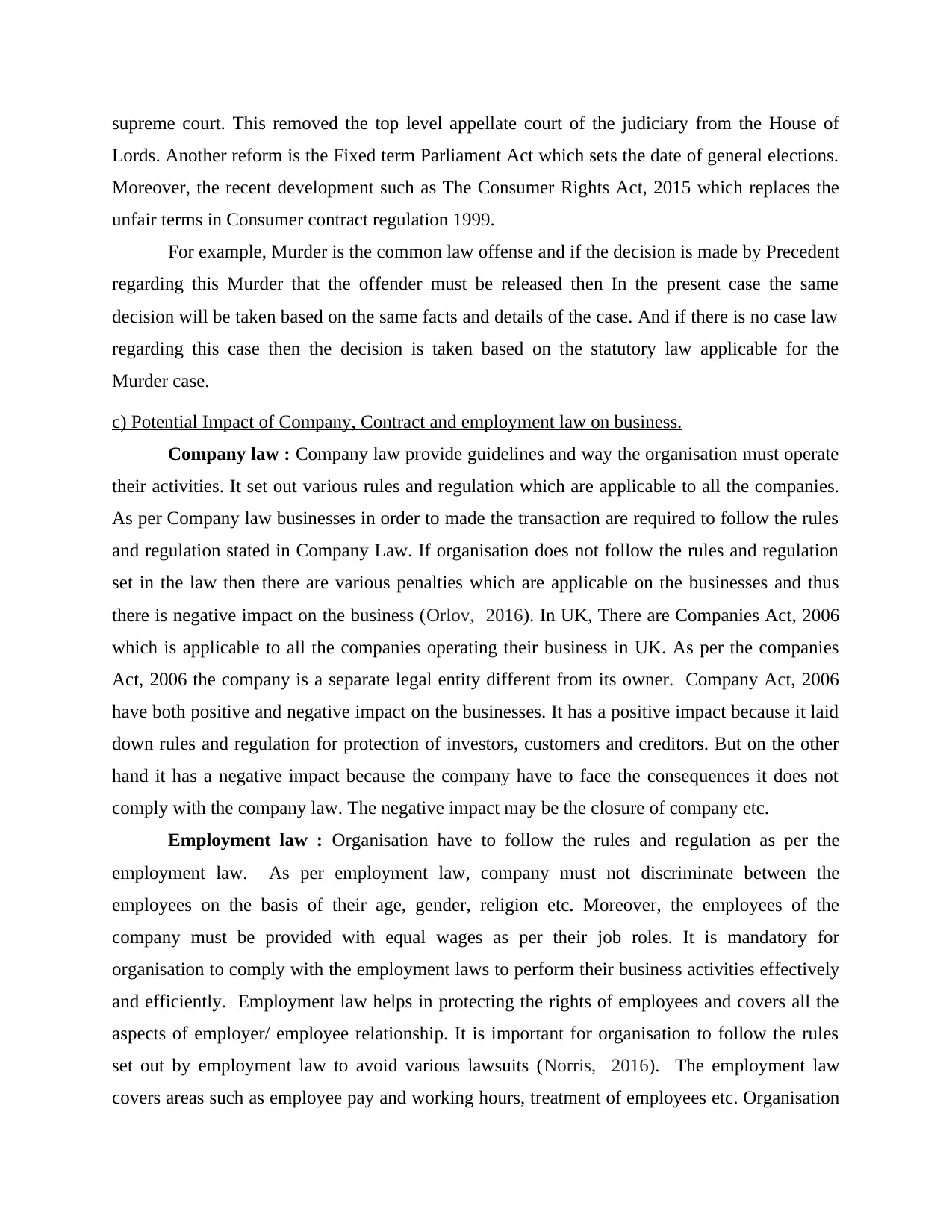
supreme court. This removed the top level appellate court of the judiciary from the House of
Lords. Another reform is the Fixed term Parliament Act which sets the date of general elections.
Moreover, the recent development such as The Consumer Rights Act, 2015 which replaces the
unfair terms in Consumer contract regulation 1999.
For example, Murder is the common law offense and if the decision is made by Precedent
regarding this Murder that the offender must be released then In the present case the same
decision will be taken based on the same facts and details of the case. And if there is no case law
regarding this case then the decision is taken based on the statutory law applicable for the
Murder case.
c) Potential Impact of Company, Contract and employment law on business.
Company law : Company law provide guidelines and way the organisation must operate
their activities. It set out various rules and regulation which are applicable to all the companies.
As per Company law businesses in order to made the transaction are required to follow the rules
and regulation stated in Company Law. If organisation does not follow the rules and regulation
set in the law then there are various penalties which are applicable on the businesses and thus
there is negative impact on the business (Orlov, 2016). In UK, There are Companies Act, 2006
which is applicable to all the companies operating their business in UK. As per the companies
Act, 2006 the company is a separate legal entity different from its owner. Company Act, 2006
have both positive and negative impact on the businesses. It has a positive impact because it laid
down rules and regulation for protection of investors, customers and creditors. But on the other
hand it has a negative impact because the company have to face the consequences it does not
comply with the company law. The negative impact may be the closure of company etc.
Employment law : Organisation have to follow the rules and regulation as per the
employment law. As per employment law, company must not discriminate between the
employees on the basis of their age, gender, religion etc. Moreover, the employees of the
company must be provided with equal wages as per their job roles. It is mandatory for
organisation to comply with the employment laws to perform their business activities effectively
and efficiently. Employment law helps in protecting the rights of employees and covers all the
aspects of employer/ employee relationship. It is important for organisation to follow the rules
set out by employment law to avoid various lawsuits (Norris, 2016). The employment law
covers areas such as employee pay and working hours, treatment of employees etc. Organisation
Lords. Another reform is the Fixed term Parliament Act which sets the date of general elections.
Moreover, the recent development such as The Consumer Rights Act, 2015 which replaces the
unfair terms in Consumer contract regulation 1999.
For example, Murder is the common law offense and if the decision is made by Precedent
regarding this Murder that the offender must be released then In the present case the same
decision will be taken based on the same facts and details of the case. And if there is no case law
regarding this case then the decision is taken based on the statutory law applicable for the
Murder case.
c) Potential Impact of Company, Contract and employment law on business.
Company law : Company law provide guidelines and way the organisation must operate
their activities. It set out various rules and regulation which are applicable to all the companies.
As per Company law businesses in order to made the transaction are required to follow the rules
and regulation stated in Company Law. If organisation does not follow the rules and regulation
set in the law then there are various penalties which are applicable on the businesses and thus
there is negative impact on the business (Orlov, 2016). In UK, There are Companies Act, 2006
which is applicable to all the companies operating their business in UK. As per the companies
Act, 2006 the company is a separate legal entity different from its owner. Company Act, 2006
have both positive and negative impact on the businesses. It has a positive impact because it laid
down rules and regulation for protection of investors, customers and creditors. But on the other
hand it has a negative impact because the company have to face the consequences it does not
comply with the company law. The negative impact may be the closure of company etc.
Employment law : Organisation have to follow the rules and regulation as per the
employment law. As per employment law, company must not discriminate between the
employees on the basis of their age, gender, religion etc. Moreover, the employees of the
company must be provided with equal wages as per their job roles. It is mandatory for
organisation to comply with the employment laws to perform their business activities effectively
and efficiently. Employment law helps in protecting the rights of employees and covers all the
aspects of employer/ employee relationship. It is important for organisation to follow the rules
set out by employment law to avoid various lawsuits (Norris, 2016). The employment law
covers areas such as employee pay and working hours, treatment of employees etc. Organisation
Paraphrase This Document
Need a fresh take? Get an instant paraphrase of this document with our AI Paraphraser
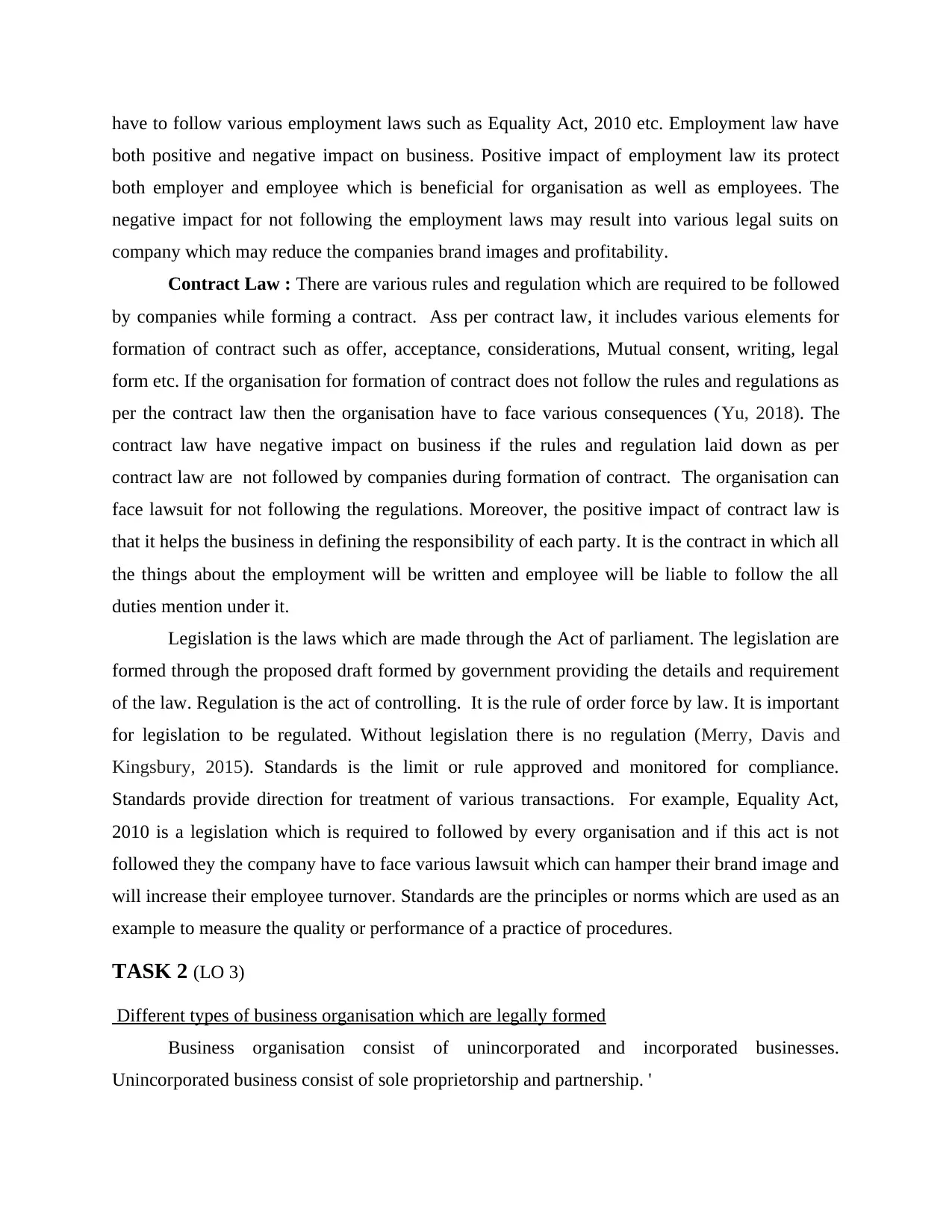
have to follow various employment laws such as Equality Act, 2010 etc. Employment law have
both positive and negative impact on business. Positive impact of employment law its protect
both employer and employee which is beneficial for organisation as well as employees. The
negative impact for not following the employment laws may result into various legal suits on
company which may reduce the companies brand images and profitability.
Contract Law : There are various rules and regulation which are required to be followed
by companies while forming a contract. Ass per contract law, it includes various elements for
formation of contract such as offer, acceptance, considerations, Mutual consent, writing, legal
form etc. If the organisation for formation of contract does not follow the rules and regulations as
per the contract law then the organisation have to face various consequences (Yu, 2018). The
contract law have negative impact on business if the rules and regulation laid down as per
contract law are not followed by companies during formation of contract. The organisation can
face lawsuit for not following the regulations. Moreover, the positive impact of contract law is
that it helps the business in defining the responsibility of each party. It is the contract in which all
the things about the employment will be written and employee will be liable to follow the all
duties mention under it.
Legislation is the laws which are made through the Act of parliament. The legislation are
formed through the proposed draft formed by government providing the details and requirement
of the law. Regulation is the act of controlling. It is the rule of order force by law. It is important
for legislation to be regulated. Without legislation there is no regulation (Merry, Davis and
Kingsbury, 2015). Standards is the limit or rule approved and monitored for compliance.
Standards provide direction for treatment of various transactions. For example, Equality Act,
2010 is a legislation which is required to followed by every organisation and if this act is not
followed they the company have to face various lawsuit which can hamper their brand image and
will increase their employee turnover. Standards are the principles or norms which are used as an
example to measure the quality or performance of a practice of procedures.
TASK 2 (LO 3)
Different types of business organisation which are legally formed
Business organisation consist of unincorporated and incorporated businesses.
Unincorporated business consist of sole proprietorship and partnership. '
both positive and negative impact on business. Positive impact of employment law its protect
both employer and employee which is beneficial for organisation as well as employees. The
negative impact for not following the employment laws may result into various legal suits on
company which may reduce the companies brand images and profitability.
Contract Law : There are various rules and regulation which are required to be followed
by companies while forming a contract. Ass per contract law, it includes various elements for
formation of contract such as offer, acceptance, considerations, Mutual consent, writing, legal
form etc. If the organisation for formation of contract does not follow the rules and regulations as
per the contract law then the organisation have to face various consequences (Yu, 2018). The
contract law have negative impact on business if the rules and regulation laid down as per
contract law are not followed by companies during formation of contract. The organisation can
face lawsuit for not following the regulations. Moreover, the positive impact of contract law is
that it helps the business in defining the responsibility of each party. It is the contract in which all
the things about the employment will be written and employee will be liable to follow the all
duties mention under it.
Legislation is the laws which are made through the Act of parliament. The legislation are
formed through the proposed draft formed by government providing the details and requirement
of the law. Regulation is the act of controlling. It is the rule of order force by law. It is important
for legislation to be regulated. Without legislation there is no regulation (Merry, Davis and
Kingsbury, 2015). Standards is the limit or rule approved and monitored for compliance.
Standards provide direction for treatment of various transactions. For example, Equality Act,
2010 is a legislation which is required to followed by every organisation and if this act is not
followed they the company have to face various lawsuit which can hamper their brand image and
will increase their employee turnover. Standards are the principles or norms which are used as an
example to measure the quality or performance of a practice of procedures.
TASK 2 (LO 3)
Different types of business organisation which are legally formed
Business organisation consist of unincorporated and incorporated businesses.
Unincorporated business consist of sole proprietorship and partnership. '
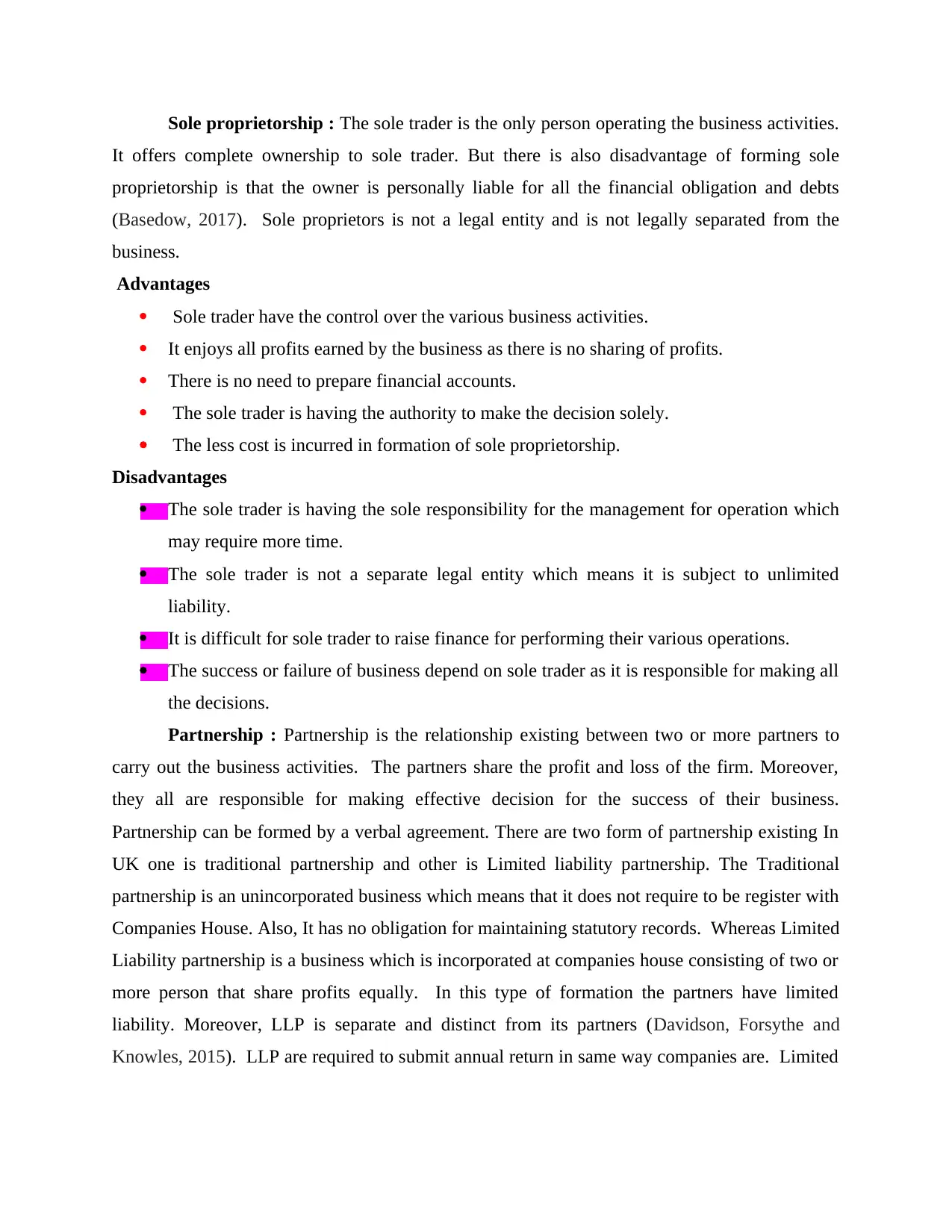
Sole proprietorship : The sole trader is the only person operating the business activities.
It offers complete ownership to sole trader. But there is also disadvantage of forming sole
proprietorship is that the owner is personally liable for all the financial obligation and debts
(Basedow, 2017). Sole proprietors is not a legal entity and is not legally separated from the
business.
Advantages
Sole trader have the control over the various business activities.
It enjoys all profits earned by the business as there is no sharing of profits.
There is no need to prepare financial accounts.
The sole trader is having the authority to make the decision solely.
The less cost is incurred in formation of sole proprietorship.
Disadvantages
The sole trader is having the sole responsibility for the management for operation which
may require more time.
The sole trader is not a separate legal entity which means it is subject to unlimited
liability.
It is difficult for sole trader to raise finance for performing their various operations.
The success or failure of business depend on sole trader as it is responsible for making all
the decisions.
Partnership : Partnership is the relationship existing between two or more partners to
carry out the business activities. The partners share the profit and loss of the firm. Moreover,
they all are responsible for making effective decision for the success of their business.
Partnership can be formed by a verbal agreement. There are two form of partnership existing In
UK one is traditional partnership and other is Limited liability partnership. The Traditional
partnership is an unincorporated business which means that it does not require to be register with
Companies House. Also, It has no obligation for maintaining statutory records. Whereas Limited
Liability partnership is a business which is incorporated at companies house consisting of two or
more person that share profits equally. In this type of formation the partners have limited
liability. Moreover, LLP is separate and distinct from its partners (Davidson, Forsythe and
Knowles, 2015). LLP are required to submit annual return in same way companies are. Limited
It offers complete ownership to sole trader. But there is also disadvantage of forming sole
proprietorship is that the owner is personally liable for all the financial obligation and debts
(Basedow, 2017). Sole proprietors is not a legal entity and is not legally separated from the
business.
Advantages
Sole trader have the control over the various business activities.
It enjoys all profits earned by the business as there is no sharing of profits.
There is no need to prepare financial accounts.
The sole trader is having the authority to make the decision solely.
The less cost is incurred in formation of sole proprietorship.
Disadvantages
The sole trader is having the sole responsibility for the management for operation which
may require more time.
The sole trader is not a separate legal entity which means it is subject to unlimited
liability.
It is difficult for sole trader to raise finance for performing their various operations.
The success or failure of business depend on sole trader as it is responsible for making all
the decisions.
Partnership : Partnership is the relationship existing between two or more partners to
carry out the business activities. The partners share the profit and loss of the firm. Moreover,
they all are responsible for making effective decision for the success of their business.
Partnership can be formed by a verbal agreement. There are two form of partnership existing In
UK one is traditional partnership and other is Limited liability partnership. The Traditional
partnership is an unincorporated business which means that it does not require to be register with
Companies House. Also, It has no obligation for maintaining statutory records. Whereas Limited
Liability partnership is a business which is incorporated at companies house consisting of two or
more person that share profits equally. In this type of formation the partners have limited
liability. Moreover, LLP is separate and distinct from its partners (Davidson, Forsythe and
Knowles, 2015). LLP are required to submit annual return in same way companies are. Limited
⊘ This is a preview!⊘
Do you want full access?
Subscribe today to unlock all pages.

Trusted by 1+ million students worldwide
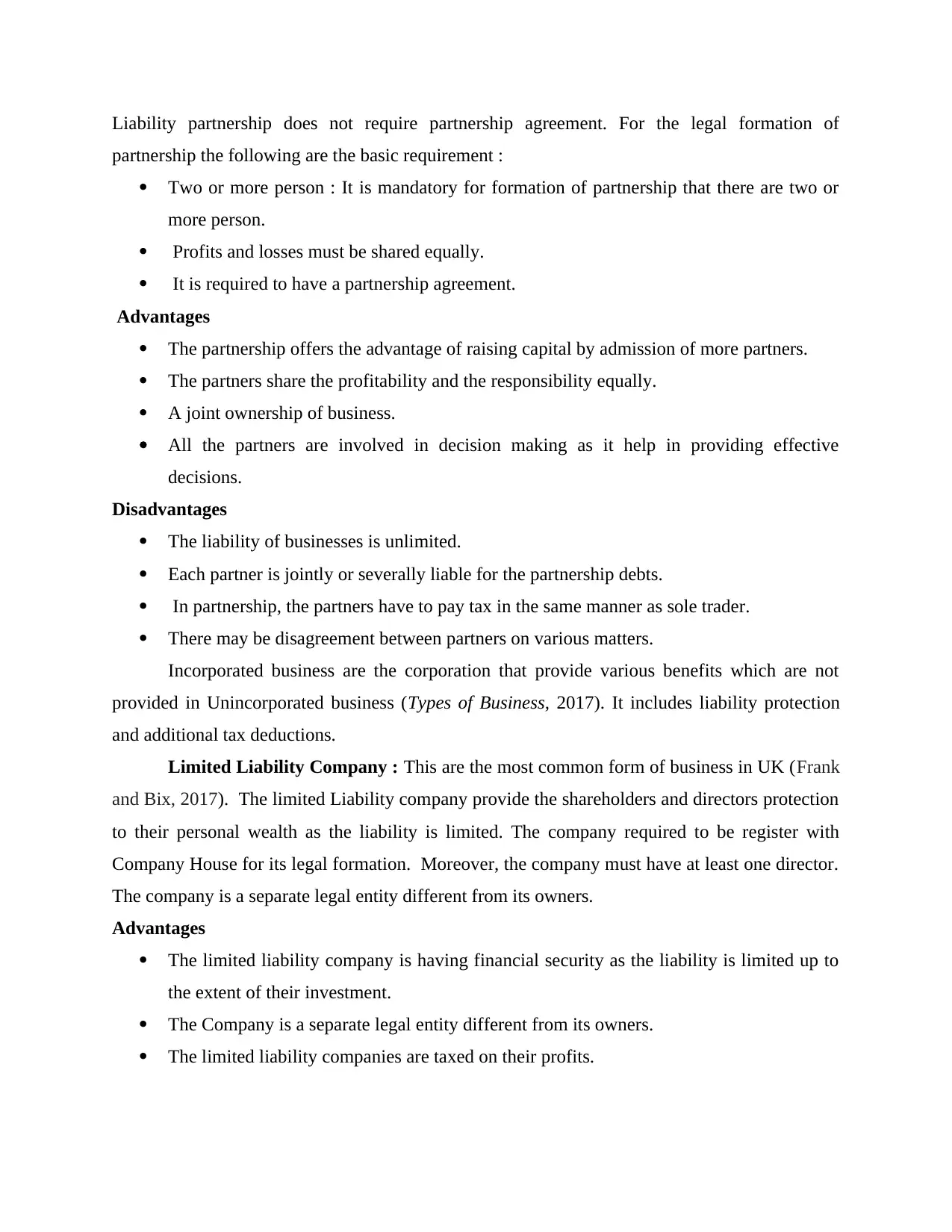
Liability partnership does not require partnership agreement. For the legal formation of
partnership the following are the basic requirement :
Two or more person : It is mandatory for formation of partnership that there are two or
more person.
Profits and losses must be shared equally.
It is required to have a partnership agreement.
Advantages
The partnership offers the advantage of raising capital by admission of more partners.
The partners share the profitability and the responsibility equally.
A joint ownership of business.
All the partners are involved in decision making as it help in providing effective
decisions.
Disadvantages
The liability of businesses is unlimited.
Each partner is jointly or severally liable for the partnership debts.
In partnership, the partners have to pay tax in the same manner as sole trader.
There may be disagreement between partners on various matters.
Incorporated business are the corporation that provide various benefits which are not
provided in Unincorporated business (Types of Business, 2017). It includes liability protection
and additional tax deductions.
Limited Liability Company : This are the most common form of business in UK (Frank
and Bix, 2017). The limited Liability company provide the shareholders and directors protection
to their personal wealth as the liability is limited. The company required to be register with
Company House for its legal formation. Moreover, the company must have at least one director.
The company is a separate legal entity different from its owners.
Advantages
The limited liability company is having financial security as the liability is limited up to
the extent of their investment.
The Company is a separate legal entity different from its owners.
The limited liability companies are taxed on their profits.
partnership the following are the basic requirement :
Two or more person : It is mandatory for formation of partnership that there are two or
more person.
Profits and losses must be shared equally.
It is required to have a partnership agreement.
Advantages
The partnership offers the advantage of raising capital by admission of more partners.
The partners share the profitability and the responsibility equally.
A joint ownership of business.
All the partners are involved in decision making as it help in providing effective
decisions.
Disadvantages
The liability of businesses is unlimited.
Each partner is jointly or severally liable for the partnership debts.
In partnership, the partners have to pay tax in the same manner as sole trader.
There may be disagreement between partners on various matters.
Incorporated business are the corporation that provide various benefits which are not
provided in Unincorporated business (Types of Business, 2017). It includes liability protection
and additional tax deductions.
Limited Liability Company : This are the most common form of business in UK (Frank
and Bix, 2017). The limited Liability company provide the shareholders and directors protection
to their personal wealth as the liability is limited. The company required to be register with
Company House for its legal formation. Moreover, the company must have at least one director.
The company is a separate legal entity different from its owners.
Advantages
The limited liability company is having financial security as the liability is limited up to
the extent of their investment.
The Company is a separate legal entity different from its owners.
The limited liability companies are taxed on their profits.
Paraphrase This Document
Need a fresh take? Get an instant paraphrase of this document with our AI Paraphraser
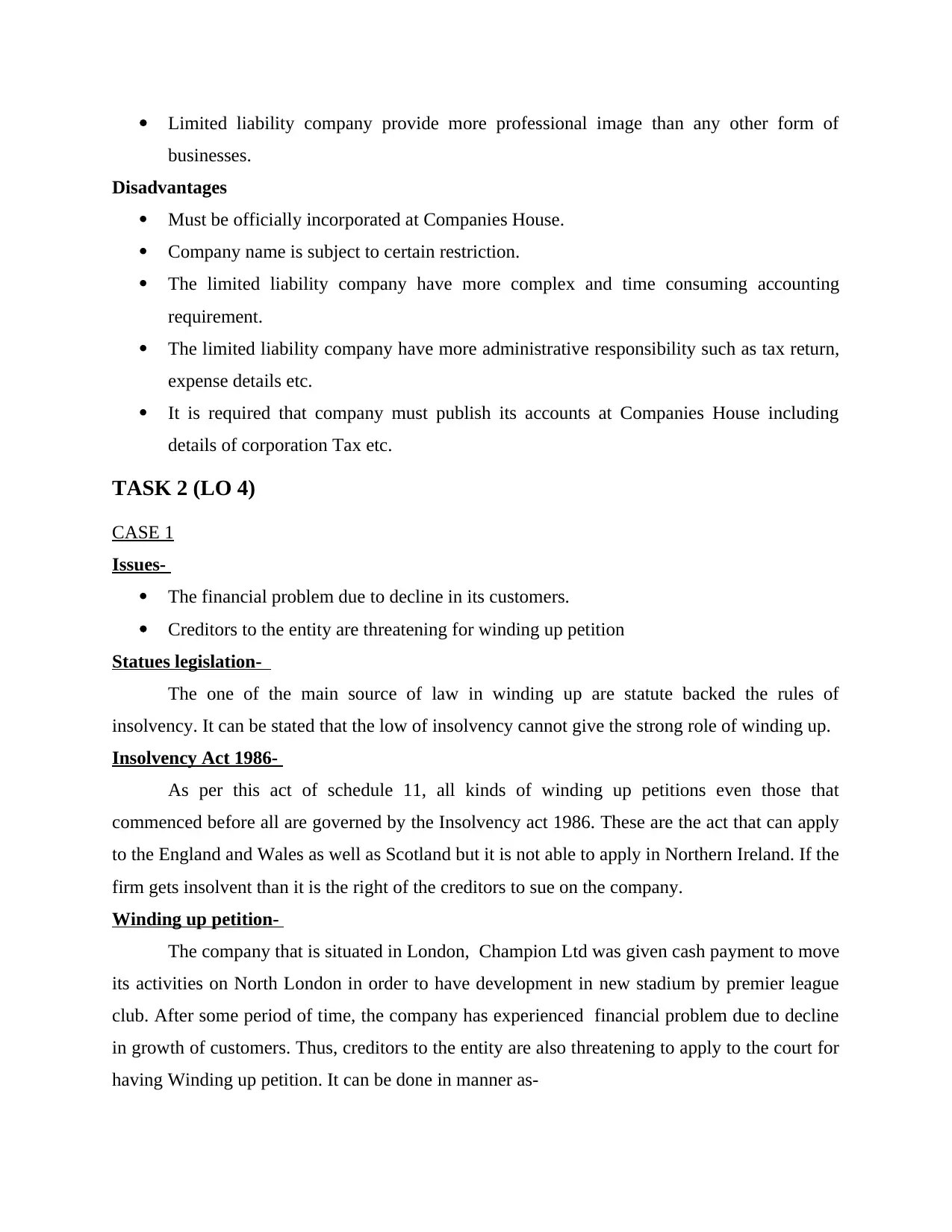
Limited liability company provide more professional image than any other form of
businesses.
Disadvantages
Must be officially incorporated at Companies House.
Company name is subject to certain restriction.
The limited liability company have more complex and time consuming accounting
requirement.
The limited liability company have more administrative responsibility such as tax return,
expense details etc.
It is required that company must publish its accounts at Companies House including
details of corporation Tax etc.
TASK 2 (LO 4)
CASE 1
Issues-
The financial problem due to decline in its customers.
Creditors to the entity are threatening for winding up petition
Statues legislation-
The one of the main source of law in winding up are statute backed the rules of
insolvency. It can be stated that the low of insolvency cannot give the strong role of winding up.
Insolvency Act 1986-
As per this act of schedule 11, all kinds of winding up petitions even those that
commenced before all are governed by the Insolvency act 1986. These are the act that can apply
to the England and Wales as well as Scotland but it is not able to apply in Northern Ireland. If the
firm gets insolvent than it is the right of the creditors to sue on the company.
Winding up petition-
The company that is situated in London, Champion Ltd was given cash payment to move
its activities on North London in order to have development in new stadium by premier league
club. After some period of time, the company has experienced financial problem due to decline
in growth of customers. Thus, creditors to the entity are also threatening to apply to the court for
having Winding up petition. It can be done in manner as-
businesses.
Disadvantages
Must be officially incorporated at Companies House.
Company name is subject to certain restriction.
The limited liability company have more complex and time consuming accounting
requirement.
The limited liability company have more administrative responsibility such as tax return,
expense details etc.
It is required that company must publish its accounts at Companies House including
details of corporation Tax etc.
TASK 2 (LO 4)
CASE 1
Issues-
The financial problem due to decline in its customers.
Creditors to the entity are threatening for winding up petition
Statues legislation-
The one of the main source of law in winding up are statute backed the rules of
insolvency. It can be stated that the low of insolvency cannot give the strong role of winding up.
Insolvency Act 1986-
As per this act of schedule 11, all kinds of winding up petitions even those that
commenced before all are governed by the Insolvency act 1986. These are the act that can apply
to the England and Wales as well as Scotland but it is not able to apply in Northern Ireland. If the
firm gets insolvent than it is the right of the creditors to sue on the company.
Winding up petition-
The company that is situated in London, Champion Ltd was given cash payment to move
its activities on North London in order to have development in new stadium by premier league
club. After some period of time, the company has experienced financial problem due to decline
in growth of customers. Thus, creditors to the entity are also threatening to apply to the court for
having Winding up petition. It can be done in manner as-
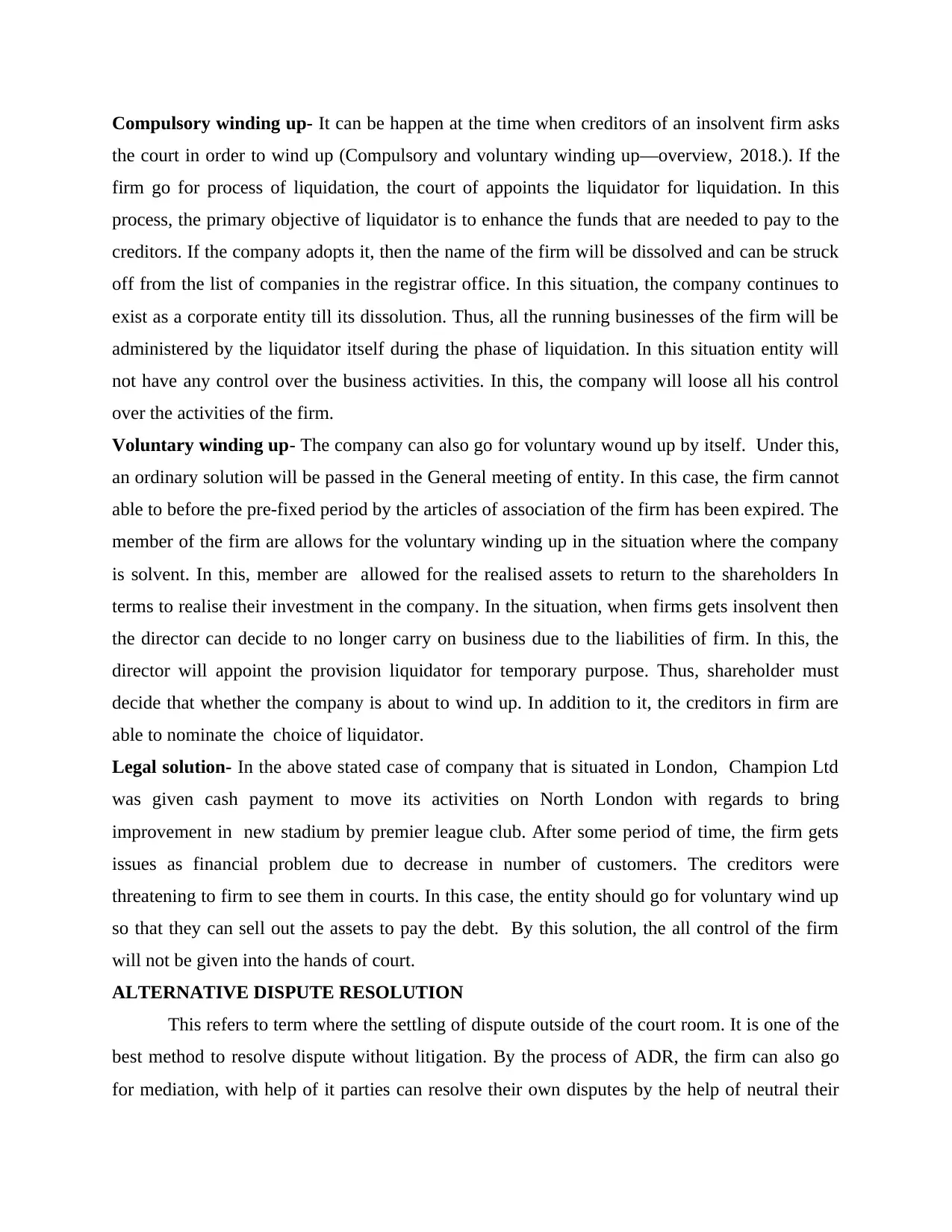
Compulsory winding up- It can be happen at the time when creditors of an insolvent firm asks
the court in order to wind up (Compulsory and voluntary winding up—overview, 2018.). If the
firm go for process of liquidation, the court of appoints the liquidator for liquidation. In this
process, the primary objective of liquidator is to enhance the funds that are needed to pay to the
creditors. If the company adopts it, then the name of the firm will be dissolved and can be struck
off from the list of companies in the registrar office. In this situation, the company continues to
exist as a corporate entity till its dissolution. Thus, all the running businesses of the firm will be
administered by the liquidator itself during the phase of liquidation. In this situation entity will
not have any control over the business activities. In this, the company will loose all his control
over the activities of the firm.
Voluntary winding up- The company can also go for voluntary wound up by itself. Under this,
an ordinary solution will be passed in the General meeting of entity. In this case, the firm cannot
able to before the pre-fixed period by the articles of association of the firm has been expired. The
member of the firm are allows for the voluntary winding up in the situation where the company
is solvent. In this, member are allowed for the realised assets to return to the shareholders In
terms to realise their investment in the company. In the situation, when firms gets insolvent then
the director can decide to no longer carry on business due to the liabilities of firm. In this, the
director will appoint the provision liquidator for temporary purpose. Thus, shareholder must
decide that whether the company is about to wind up. In addition to it, the creditors in firm are
able to nominate the choice of liquidator.
Legal solution- In the above stated case of company that is situated in London, Champion Ltd
was given cash payment to move its activities on North London with regards to bring
improvement in new stadium by premier league club. After some period of time, the firm gets
issues as financial problem due to decrease in number of customers. The creditors were
threatening to firm to see them in courts. In this case, the entity should go for voluntary wind up
so that they can sell out the assets to pay the debt. By this solution, the all control of the firm
will not be given into the hands of court.
ALTERNATIVE DISPUTE RESOLUTION
This refers to term where the settling of dispute outside of the court room. It is one of the
best method to resolve dispute without litigation. By the process of ADR, the firm can also go
for mediation, with help of it parties can resolve their own disputes by the help of neutral their
the court in order to wind up (Compulsory and voluntary winding up—overview, 2018.). If the
firm go for process of liquidation, the court of appoints the liquidator for liquidation. In this
process, the primary objective of liquidator is to enhance the funds that are needed to pay to the
creditors. If the company adopts it, then the name of the firm will be dissolved and can be struck
off from the list of companies in the registrar office. In this situation, the company continues to
exist as a corporate entity till its dissolution. Thus, all the running businesses of the firm will be
administered by the liquidator itself during the phase of liquidation. In this situation entity will
not have any control over the business activities. In this, the company will loose all his control
over the activities of the firm.
Voluntary winding up- The company can also go for voluntary wound up by itself. Under this,
an ordinary solution will be passed in the General meeting of entity. In this case, the firm cannot
able to before the pre-fixed period by the articles of association of the firm has been expired. The
member of the firm are allows for the voluntary winding up in the situation where the company
is solvent. In this, member are allowed for the realised assets to return to the shareholders In
terms to realise their investment in the company. In the situation, when firms gets insolvent then
the director can decide to no longer carry on business due to the liabilities of firm. In this, the
director will appoint the provision liquidator for temporary purpose. Thus, shareholder must
decide that whether the company is about to wind up. In addition to it, the creditors in firm are
able to nominate the choice of liquidator.
Legal solution- In the above stated case of company that is situated in London, Champion Ltd
was given cash payment to move its activities on North London with regards to bring
improvement in new stadium by premier league club. After some period of time, the firm gets
issues as financial problem due to decrease in number of customers. The creditors were
threatening to firm to see them in courts. In this case, the entity should go for voluntary wind up
so that they can sell out the assets to pay the debt. By this solution, the all control of the firm
will not be given into the hands of court.
ALTERNATIVE DISPUTE RESOLUTION
This refers to term where the settling of dispute outside of the court room. It is one of the
best method to resolve dispute without litigation. By the process of ADR, the firm can also go
for mediation, with help of it parties can resolve their own disputes by the help of neutral their
⊘ This is a preview!⊘
Do you want full access?
Subscribe today to unlock all pages.

Trusted by 1+ million students worldwide
1 out of 16
Related Documents
Your All-in-One AI-Powered Toolkit for Academic Success.
+13062052269
info@desklib.com
Available 24*7 on WhatsApp / Email
![[object Object]](/_next/static/media/star-bottom.7253800d.svg)
Unlock your academic potential
Copyright © 2020–2026 A2Z Services. All Rights Reserved. Developed and managed by ZUCOL.



